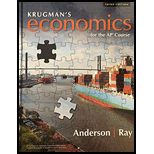
a.
The effect on money supply if people hold more cash.
a.
Explanation of Solution
Banks expand their deposits through lending. Money supply expansion will be hindered if people will hold more cash and deposit less to the bank as bank will lend less. For instance, If $1000 is deposited by Person A then bank can lend $900 further keeping reserve of $100 (10% of $1000). Further bank lent $900 to Person B who deposited only $500 in the bank then bank will be able to lend $450 only further which means money supply will be $900+$450 i.e. 1350.
If Person B might have deposited the whole amount then money supply will be $900 +$810 ($900-$90).
Therefore, holding more cash will reduce the money supply.
Money multiplier: Money multiplier refers to the ratio of money supply to the monetary base. It is equal to 1/rr which depicts the expansion of money supply.
b.
The effect on money supply if bank hold more
b.
Explanation of Solution
If reserve ratio is 20% then bank is capable of lending only $800 whereas if Person A deposited $1000. This is because $200 (20% of $1000) is required to be kept in bank’s reserve. For instance the bank is required to keep reserve ratio of 10% instead of 20% then the money supply will be more. For instance, bank can lend $900 instead of $800 if reserve ratio is 10%. But if bank keeps 20% reserve even if Fed asked to keep only 10% reserve then bank keep funds that cannot be lent out. Thus this will hinder the expansion of money.
Money multiplier: Money multiplier refers to the ratio of money supply to the monetary base. It is equal to 1/rr which depicts the expansion of money supply.
Required reserve ratio: Required reserve ratio refers to the portion of the total money deposits that is collected by the banks. This amount cannot be used for further lending or investing purpose. The percentage is decided by the Federal Reserve.
c.
The effect on money supply if Fed increases the reserve ratio.
c.
Explanation of Solution
If Fed asks to keep more reserves then bank have to maintain such reserves. The money kept as reserve will not be lent out. Bank expands money supply by lending. If excess reserve is required to be kept as per Fed’s regulation then bank will not be able to increase the money supply in the economy.
This could also be understood by using money multiplier concept. Money multiplier depicts the expansion of money. For instance, bank has total deposits of $1000 and Federal Reserve ratio is 10% then money multiplier will be 10 which means money supply will be $10,000 ($1000 x 10). Whereas money multiplier will be 5 only if rr is 20% then money supply will be $5000 ($1000 x 5).
Federal Reserve System: It is a central bank that looks after the banking system of the country along with the control of its monetary base. Monetary base is the sum of circulating currency and the reserves in the bank.
Required reserve ratio: Required reserve ratio refers to the portion of the total money deposits that is collected by the banks. This amount cannot be used for further lending or investing purpose. The percentage is decided by the Federal Reserve.
Chapter 25 Solutions
Krugman's Economics For The Ap® Course

 Principles of Economics (12th Edition)EconomicsISBN:9780134078779Author:Karl E. Case, Ray C. Fair, Sharon E. OsterPublisher:PEARSON
Principles of Economics (12th Edition)EconomicsISBN:9780134078779Author:Karl E. Case, Ray C. Fair, Sharon E. OsterPublisher:PEARSON Engineering Economy (17th Edition)EconomicsISBN:9780134870069Author:William G. Sullivan, Elin M. Wicks, C. Patrick KoellingPublisher:PEARSON
Engineering Economy (17th Edition)EconomicsISBN:9780134870069Author:William G. Sullivan, Elin M. Wicks, C. Patrick KoellingPublisher:PEARSON Principles of Economics (MindTap Course List)EconomicsISBN:9781305585126Author:N. Gregory MankiwPublisher:Cengage Learning
Principles of Economics (MindTap Course List)EconomicsISBN:9781305585126Author:N. Gregory MankiwPublisher:Cengage Learning Managerial Economics: A Problem Solving ApproachEconomicsISBN:9781337106665Author:Luke M. Froeb, Brian T. McCann, Michael R. Ward, Mike ShorPublisher:Cengage Learning
Managerial Economics: A Problem Solving ApproachEconomicsISBN:9781337106665Author:Luke M. Froeb, Brian T. McCann, Michael R. Ward, Mike ShorPublisher:Cengage Learning Managerial Economics & Business Strategy (Mcgraw-...EconomicsISBN:9781259290619Author:Michael Baye, Jeff PrincePublisher:McGraw-Hill Education
Managerial Economics & Business Strategy (Mcgraw-...EconomicsISBN:9781259290619Author:Michael Baye, Jeff PrincePublisher:McGraw-Hill Education





